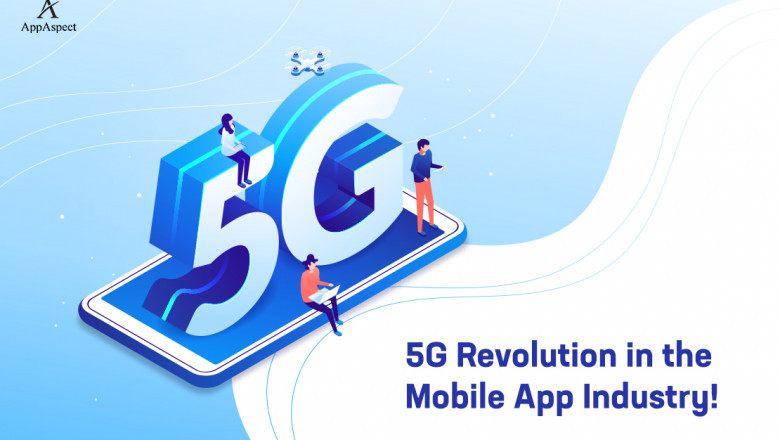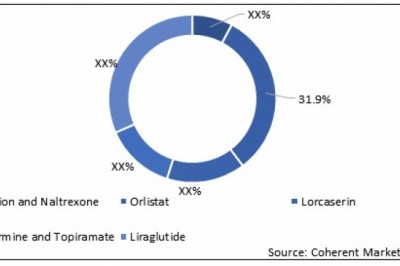views

After more than a decade of development, the new 5G network is finally about to materialize. You can anticipate significantly quicker download and upload rates from your mobile devices with it. We aren't joking!
According to experts, download speeds may increase by a factor of 10 to 20 from what we currently experience. And this will alter how we engage with the technology that surrounds us every day, including our mobile devices.
As the number of people using smart devices and embracing the newest technology rises tremendously, developers continuously work to satisfy customer needs.
The exponential growth of 5G
The newest radio technology, the Fifth-Generation (5G) wireless cellular network, is designed to provide high-speed performance. It is not an improved version of 4G, but rather a whole new technology that merits consideration in the modern era.
Three separate spectrums are used by 5G:
-
LTE is now operating on the low-band, which is quickly filling to capacity. provides excellent coverage and penetration through barriers like buildings.
-
Mid-Band - Offers quicker coverage and reduced latency but has less building penetration than low-band.
-
High-Band - Provides the fastest speeds and smallest latency, but it also has a limited coverage area and poorer building penetration. what the majority of people envision when discussing 5G.
Although an extensive rollout has been delayed due to COVID-19, the world has its eyes on 5G. Mobile operators are expanding and upgrading their networks by investing $160 billion each year in the deployment of 5G.
Three key advancements are brought forth by 5G:
-
Greater Speeds
-
Lower Latency
-
More Connectivity
The fact is that as the globe becomes more mobile, we produce, consume, and recycle more data than ever before. The usage of streaming video and music keeps rising.
You'll start to notice the effects of 5G in all the tiny things after the initial ramp-up phase this year when the majority of carriers will employ the new 5G infrastructure to supplement the current 4G LTE network.
If you play video games, you might experience less lag when pressing a console button to see the result on the screen. We mean this when we say that you'll experience less latency. The 50-millisecond average latency of 4G should (eventually) be reduced to only one pitiful millisecond by 5G.
In a similar line, the "Internet of Things" will benefit from lower latency. IoT refers to the interconnection of many items that we encounter on a regular basis. Data communication between devices must become a seamless process in order for this to meet peoples' rising expectations.
The development of driverless vehicles will be greatly aided by 5G.
Autonomous vehicles will need to do a variety of simultaneous tasks, including speedy communication, reading of real-time traffic data, constant mapping of their surroundings, and remote operation over great distances. This requires a network that is 10–20 times more powerful than 4G at data transport.
Mobile apps using 5G: The Changing Landscape
As can be seen, 5G is prepared to revolutionize the market for mobile devices. Additionally, it is anticipated to have a significant impact on mobile applications. Through its improved features and faster speeds, 5G technology is expected to significantly improve user experience.
Mobile applications enabled by 5G will give customers access to cutting-edge technology like IoT, UltraHD films, cloud computing, Augmented Reality, and Virtual Reality (AR & VR). Everything is done: 5G will fundamentally alter the creation of mobile applications.
Impact of 5G on the mobile app industry
-
Seamless IoT Implementation -
IoT 5G's seamless deployment will make it possible to expand the applications of IoT by creating apps for various connected device kinds. The applications will enable smooth interoperability between smart devices, wearable technology, and sensor-based machinery.
They will be able to operate at peak efficiency while consuming less power and bandwidth. Additionally, developers may use AI, ML, and the capability of 5G to integrate ambient computing into their apps and make them smarter.
As the use of linked devices becomes more widespread, it will promote a better and more seamless user experience. In summary, businesses have the chance to generate significant amounts of revenue through the use of advanced technologies like 5G on mobile apps.
-
Stream videos efficiently -
Applications supported by 5G are anticipated to deliver media-rich user experiences with smoother video streaming. By enabling high-resolution live streaming at a faster rate, the technology will revolutionize video streaming.
The efficiency of video app performance will be improved by lower latency. An uninterrupted viewing experience will be possible thanks to the long battery life.
High-performing 4K videos can be incorporated by developers to highlight goods and services in the app. Additionally, it is advantageous to users!
-
Additional opportunities for integrating AR and VR
Due to network difficulties, developers have not been able to widely incorporate AR and VR into their mobile applications. The data transfer efficiency and speed promised by 5G will enable the development of an enhanced user experience.
These apps will run smoothly because 5G gives them the ability to get beyond latency and bandwidth issues. They will be able to handle larger amounts of data at much faster rates, resulting in more interactive and captivating experiences.
AR and VR technologies can significantly alter how consumers shop by enabling them to make adjustments and create a product that is perfectly in line with their tastes and needs — all from their hand-held devices. This can happen in a variety of industries, from eCommerce and retail to automobiles and sportswear.
-
Technology that puts you within the action -
Mobile app development based on immersive 3D and AR could benefit from 5G. These applications will revolutionize the field of mobile app development. They will be helpful in providing 3D features for a variety of industries, including immersive gaming and 3D printing.
These applications will be helpful in many different areas, from healthcare to construction. For instance, IKEA already uses the technology with its "IKEA Place" app, which gives users access to a library of over 2,000 products that they can try out in a space with a few easy tips. There is no better time than this!
-
Improvements to GPS performance -
The accuracy of information distribution will improve with GPS-based mobile app development. The 5G network's increased speed and improved connectivity will assure real-time accuracy of findings, enhancing the functionality of navigational applications.
The automobile sector will benefit from these apps. They will increase how effectively autonomous vehicles operate. Through wearable technology and portable devices, they can also contribute to the delivery of enhanced connected experiences.
-
Improving cloud compatibility -
Scalability is a crucial quality that 5G technology supports. File transfers to the cloud will be quicker and simpler because of the extraordinarily high transmission speeds. This will promote the move of technical storage and infrastructure to the cloud.
To lessen reliance on device hardware, developers will incorporate cloud accessibility into their mobile app creation. The consumers' access to their cloud storage would be effortless thanks to minimal latency and great performance.
-
Fewer hardware restrictions and continuous communication
Hardware constraints won't influence mobile apps with 5G support. The technology enables developers to use technologies that support real-time connectivity and cloud-based services to deliver tailored experiences.
Devices are less likely to disconnect from the network since 5G is a more dependable and battery-efficient network than its predecessors. Companies can take advantage of the constant access for their mobile apps with such always-on connectivity, giving users a more sophisticated ambient connectivity.
-
UX of the app is being improved
An app's load time will be reduced by the enhanced connectivity provided by 5G, increasing its responsiveness. Giving the app better performance and visual clarity would dramatically improve the user experience. While improving UX, developers will be able to add more features to the mobile app.
-
Apps for Smart Cities
The deployment of 5G will extend beyond the Internet of Things. In fact, it will make it possible to build "smart cities" with countless numbers of sensors and connected gadgets.
Smart cities, on the other hand, will present a distinctive platform for business development where numerous mobile apps will be synchronized to do things like stop crime, lessen pollution, and create real-time emergency alerts.
A new kind of partnership prospects for both competitive and non-competing businesses will result from this.
To sum it all up
The pandemic has extended the projected dates for the global rollout of 5G. However, when it becomes more widely used over time, developers will be able to maximize the technology's potential and bring out its best features.
The creation of mobile apps will be changed by 5G in order to accommodate apps that are more powerful than 5G-enabled handsets. It will be crucial for developers to make use of 5G's benefits in their mobile applications due to changing customer needs.
They will be able to create apps that work as well on IoT gadgets and wearable technology. But for the time being, businesses will add 5G technology as a supplement to other current networks.
Since practically all calculations will now be done on the server, the higher internet speed will result in cheaper energy expenditures and longer battery life. In conclusion, improving user experiences will result in more app revenues and improved user retention rates in the future.












